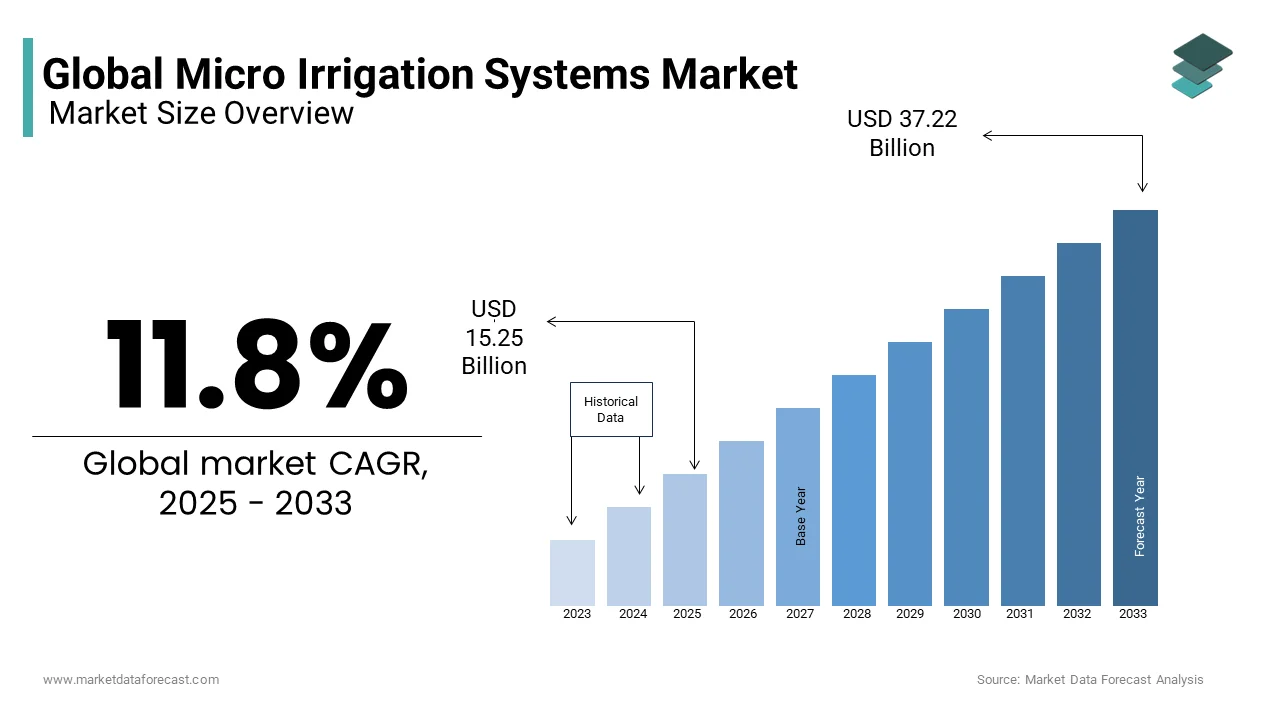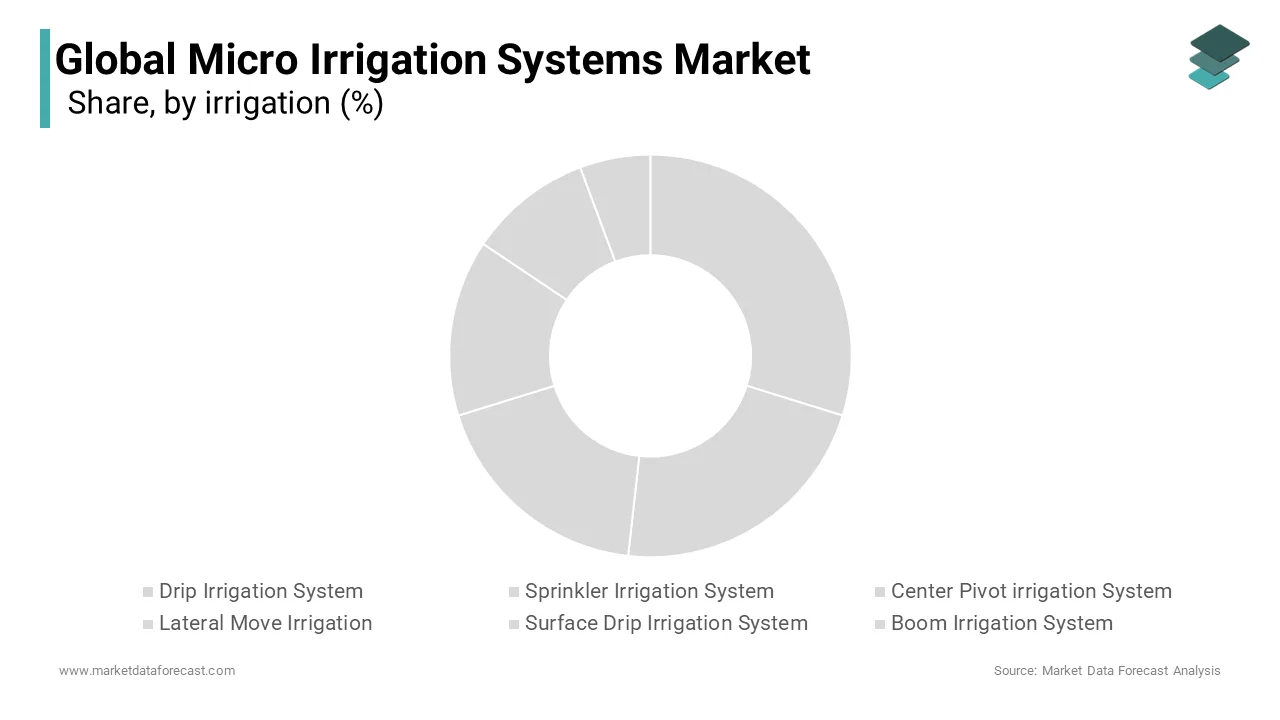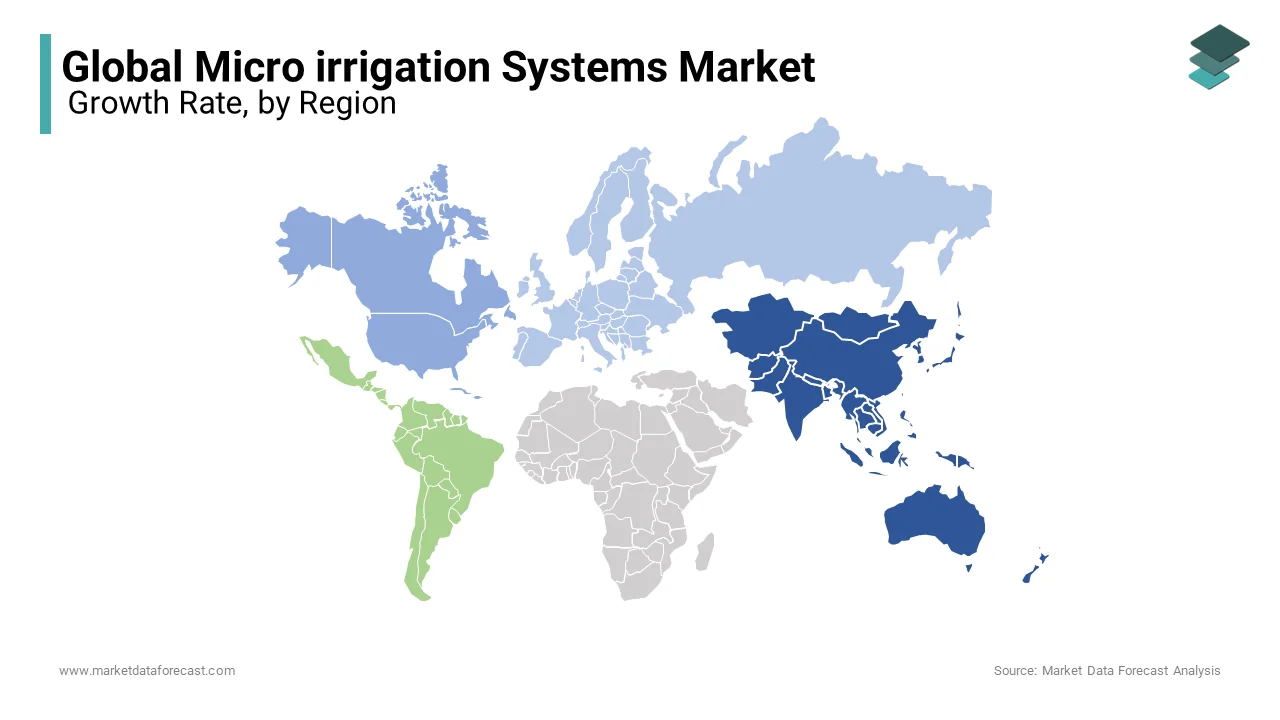Global Micro Irrigation Systems Market Size, Share, Trends, & Growth Forecast Report, Segmented By Type (Drip, Micro-Sprinkler Irrigation System and Spray), Crop Type (Orchards and Vineyards, Field Crops, Plantation Crops, Vegetables and Others), End-User (Farmers, Industrial Users and Others) and Region (North America, Europe, Asia Pacific, Latin America, Middle East and Africa), Industry Analysis From 2025 to 2033
Global Micro Irrigation Systems Market
The global micro irrigation systems market was valued at USD 13.64 billion in 2024 and is anticipated to reach USD 15.25 billion in 2025 from USD 37.22 billion by 2033, growing at a compound annual growth rate (CAGR) of 11.8% during the forecast period from 2025 to 2033.

The micro irrigation system is an advanced mechanism to provide water to the roots of plants and uses comparatively less water than the regular sprinkler system. The primary factor contributing to the demand in the global micro irrigation systems market is the rising population and the need for more food products to meet daily requirements. There is a surge in the scarcity of water resources across the world, which is also driving the need for microirrigation systems to optimize water delivery and reduce wastage. Also, the benefits of these systems, like enhanced yield, improved quality, accurate water control, and delivery of nutrients, are promoting their adoption in farming practices.
The spike in the adoption of new practices in agriculture due to favorable government regulations and incentives is also supporting growth in the micro-irrigation systems market. Recent technological advancements have led to the implementation of new features in cultivation like sensors, automation, precision farming, and others to boost overall efficiency and sustainability. Besides, the recent trend of global warming is hindering the pattern of seasons and resulting in uncertain rain conditions. Therefore, there is a huge emphasis on effective solutions to ensure water supply at required times and maintain water levels according to climatic changes, which is promoting the micro irrigation systems market. Moreover, the boom in the adoption of greenhouse practices and cultivation of high-value crops, irrespective of seasons, are supposed to create lucrative opportunities for the micro irrigation systems market in the coming years.
The major challenge in the micro irrigation systems market is the concerns related to initial setup costs of techniques like drip and sprinkler systems among small and medium-scale farmers. The lack of a proper power supply and rising utility costs are creating a negative influence on the rapid development of this business. In addition, the technical experience to install and operate the irrigation systems because of the lack of proper training and knowledge in farmers is also influencing the market demand. Besides, the improper maintenance of the systems, such as failure to remove impurities in emitters in a timely manner, can increase the expenses. Also, the unavailability of affordable financial solutions and flexible payments, coupled with the shortage of water distribution networks and storage facilities, is limiting the global microirrigation systems market. Furthermore, the resistance from farmers to adopting new technologies in some of the developing nations and small and fragmented lands is also acting as a threat to the growth of the micro irrigation systems market.
Impact Of COVID-19 On The Micro Irrigation Systems Market
The COVID-19 pandemic had an initial negative impact on the agriculture sector and micro irrigation systems market due to disruptions to the supply chain and restricted logistics across the globe to distribute the equipment. The lockdown situation globally changed consumer priorities towards essentials, limiting the production of tools and equipment used in the installation and repair of these systems. In addition, the temporary shutdown of industries and social distancing measures led to a shortage of workforce in the manufacturing units. The market instability along with the uncertainty in the adoption of new processes, had limited most of the companies to slow down their investments, which affected the micro irrigation systems market. In addition, several governments have shifted funds towards essentials during COVID-19, which impacted developments in the agriculture sector. Moreover, the strict lockdown conditions and safety protocols resulted in the closure of end-user industries like hotels and restaurants, which impacted the demand for food products. However, COVID-19 also highlighted the need for healthy food products and increased the scope of greenhouse implementations to handle natural or man-made calamities and weather uncertainties in several parts of the world.
REPORT COVERAGE
|
REPORT METRIC |
DETAILS |
|
Market Size Available |
2024 to 2033 |
|
Base Year |
2024 |
|
Forecast Period |
2025 to 2033 |
|
CAGR |
17.80% |
|
Segments Covered |
Based on Type, Crop Type, End User, and Region |
|
Various Analyses Covered |
Global, Regional and country-level analysis; Segment-Level Analysis, DROC, PESTLE Analysis, Porter’s Five Forces Analysis, Competitive Landscape, Analyst Overview of Investment Opportunities |
|
Regions Covered |
North America, Europe, APAC, Latin America, Middle East & Africa |
|
Market Leaders Profiled |
Nelson Irrigation, Lindsay Corporation, Netafim Limited, Rain Bird Corporation, Valmont Industries, Inc., Jain Irrigation Systems Limited, Hunter Industries, The Toro Company, Rivulis Irrigation, T-L Irrigation Company, Chinadrip Irrigation Equipment Co., Deere & Company, Mahindra, Antelco, Harvel Agua, Elgo Irrigation Limited, Kothari Agritech Private Ltd, EPC Industrie, and Eurodrip SA. |
SEGMENT ANALYSIS
By Type Insighst
Drip irrigation systems are likely to witness the highest demand in the global micro irrigation systems market in the forecast period due to their ease of use and high efficiency. In particular, the cost-affordability and effective water management solution offered by the drip systems are propelling their adoption in crop cultivation.

Similarly, the micro-sprinkler system is also estimated to increase at a significant rate in the predicted period because of the rising demand for this mechanism to offer the required insulation for crops in cold climatic conditions.
By Crop Type Insighst
The orchards and vineyards segment is anticipated to witness a considerable growth rate in the market owing to the requirement for precise water supply at appropriate times to obtain better yields. Sensor-based micro irrigation systems are finding huge demand in orchards and vineyards. In addition, the field crops segment is also estimated to develop at a notable rate in the following years.
By End User Insights
The farmer's segment held the lion’s share in the micro irrigation systems market and is predicted to continue its dominion in the outlook period. The increasing focus of government and private organizations on improving agricultural yields and offering incentives to farmers is majorly boosting sales in this segment. Technological developments like automation and sensors to distribute water for crops are encouraging farmers to adopt the sprinkler and drip processes, supporting the growth of the microirrigation systems market. Similarly, industrial areas and government facilities are also predicted to register steady growth in the coming days with an emphasis on reducing water wastage and providing efficient cleaning solutions.
REGIONAL ANALYSIS
The Asia Pacific region dominates the global microgrid systems market and is expected to register the highest growth rate in this market with the increasing agricultural practices in nations like India, China, and Japan. The surge in the local population, along with the scarcity of water sources, is boosting the need for advanced irrigation systems like sprinklers and drips. China and India are the leading players in this region with the expanding agriculture sector and implementation of technological processes in water management. China is also a leading exporter of micro-irrigation system parts and offers financial solutions to farmers to encourage the adoption of advanced irrigation systems. In addition, India is also witnessing a surge in the adoption of these systems owing to the supporting government initiatives like the Micro Irrigation fund and the need to find alternatives to rainwater. Drip irrigation systems will be in huge demand in this region in the coming days.

North America is also predicted to record significant growth in the global microirrigation systems market. The United States is the leading nation in this region because of the extensive use of groundwater for irrigation. The rising demand for agriculture coupled with the rising adoption of sprinkler systems in industrial facilities is driving the demand for the micro irrigation systems business.
Europe is also a prominent player in this market with an established agriculture industry in nations like the United Kingdom and Spain. Spain is the leading area in this continent because of government reforms like irrigation subsidies and public water rights. There is also a rise in the usage of geographic information systems and remote-control systems, which is benefitting the European micro irrigation systems market.
Latin America, with nations like Brazil and Argentina, is an emerging player in the global micro irrigation systems market. The government-regulated agriculture and the increasing need for sustainable farming are driving the business in this locale. In addition, the large plantations of corn and soybean that need water supply, irrespective of climatic conditions, are supposed to boost the growth potential in this region.
Middle East and Africa is a comparatively smaller market for the micro irrigation systems market. However, there is a huge untapped opportunity in these nations because of the improved government spending and augmented need for food products.
KEY MARKET PLAYERS
Nelson Irrigation, Lindsay Corporation, Netafim Limited, Rain Bird Corporation, Valmont Industries, Inc., Jain Irrigation Systems Limited, Hunter Industries, The Toro Company, Rivulis Irrigation, T-L Irrigation Company, Chinadrip Irrigation Equipment Co., Deere & Company, Mahindra, Antelco, Harvel Agua, Elgo Irrigation Limited, Kothari Agritech Private Ltd, EPC Industrie, and Eurodrip SA. Are some of the major key players involved in the microirrigation market?
RECENT HAPPENINGS IN THIS MARKET
- In November 2023, Rivulis, a renowned microirrituring company, introduced its new initiative to offer extensive knowledge to farmers and agribusiness entities around the world. The drip irrigation guide from Rivulis ensures world-class operation to improve the yield and quality of crops.
- In March 2023, Irrigreen, a leading entity in robotic irrigation systems, confirmed its recent funding of 15 million USD. The company aims to reduce water wastage in household activities and water bills with the use of smart sprinkler systems that include inkjet printing technology.
- In March 2022, PepsiCo and N-Drip shook hands to expand the usage of the latter’s highly effective irrigation systems across the globe to assist farmers in increasing productivity and reducing maintenance costs of water storage and management.
MARKET SEGMENTATION
This research report on the global micro irrigation market has been segmented and sub-segmented into the following categories.
By Irrigation Technology
- Drip Irrigation System
- Backflow Preventers
- Filters
- Drip Tubes
- Valves
- Pressure Regulators
- Emitters
- Others
- Sprinkler Irrigation System
- Tubing
- Sprinkler Heads
- Pumping Units
- Couplers
- Fittings & Accessories
- Others
- Center Pivot Irrigation System
- Pipelines
- System Control Towers
- Water Emitters
- Central Towers
- Lateral Move Irrigation System
- Pipelines
- Sprinkler Heads
- Drive Mechanisms
- Control Panels
- Water Distribution Units
- Subsurface Drip Irrigation (SDI) Systems
- Tubing
- Pressure Regulators
- Water Filtration Units
- Drip Emitters
- Boom Irrigation Systems
- Overhead Booms
- Nozzles
- Water Pumps
By Application
- Plantation Crops
- Orchard Crops & Vineyards
- Field Crops
- Forage & Turf Grasses
- Greenhouse Crops
- Others
By End User
- Farmers
- Industrial Growers
- Others
By Region
- North America
- Europe
- Asia Pacific
- Latin America
- The Middle East and Africa
Frequently Asked Questions
what is the current size of global micro irrigation system market?
The current size of the global Micro irrigation systems market is USD 15.25 billion in 2025.
what is the growth of micro irrigation system market?
The micro irrigation system market is estimated to be growing at a CAGR of 17.80%, to reach USD 37.22 billion by 2033.
what are key market players involved in micro irrigation system market?
Nelson Irrigation, Lindsay Corporation, Netafim Limited, Rain Bird Corporation, Valmont Industries, Inc., Jain Irrigation Systems Limited, Hunter Industries, The Toro Company, Rivulis Irrigation, T-L Irrigation Company, Chinadrip Irrigation Equipment Co., Deere & Company, Mahindra, Antelco, Harvel Agua, Elgo Irrigation Limited, Kothari Agritech Private Ltd, EPC Industrie, and Eurodrip SA. Are some of the major key players involved in the microirrigation market.
Related Reports
Access the study in MULTIPLE FORMATS
Purchase options starting from $ 2500
Didn’t find what you’re looking for?
TALK TO OUR ANALYST TEAM
Need something within your budget?
NO WORRIES! WE GOT YOU COVERED!
Call us on: +1 888 702 9696 (U.S Toll Free)
Write to us: [email protected]